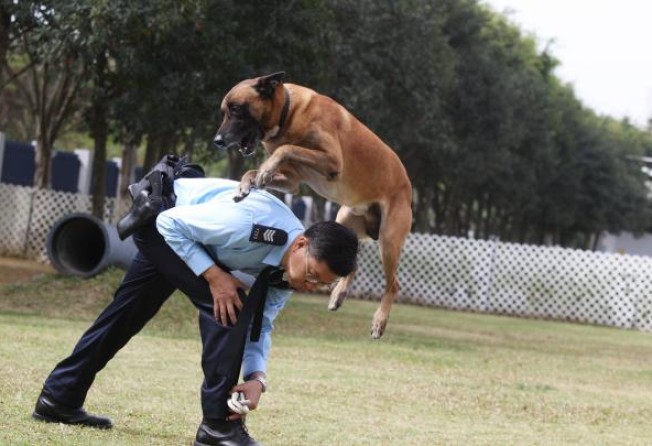Hong Kong police canines to do double duty as drugs dogs
Police have begun years-long effort to train their 75 patrol dogs to help sniff out illegal narcotics

Police dogs are generally specialists, trained to find drugs or explosives, or to go on patrols, among other tasks. But Hong Kong's patrol dogs will soon do double duty in drug detection.
"We are in the middle of training all of our police patrol dogs to also conduct drug detection work," said James Lee Cheuk-wai, chief inspector of the police dog unit.
The initiative to "add value" to patrol dogs started in 2010, with 16 of the 75 the dogs already trained. Lee said it would take another three to four years to train all the dogs in drug detection.
The Hong Kong Police Force currently has 115 police dogs. Apart from 75 patrol dogs, there are 10 specialised in drug detection and tracking, 16 in passive-alert drug detection and 14 in finding explosives. The force has around 100 dog handlers.
"Sometimes a dog is even more useful than a few carloads of officers," said policewoman Luk Ho-wing, one of the 10 women who serve as dog handlers on the force. "Dogs have been most useful in violent or near-violent situations - they usually can help subdue people without anyone getting hurt."
Her dog, Lyca, is among the first four patrol dogs trained to find drugs.
Luk was once on patrol alone with Lyca when they caught a man with drugs. The man resisted arrest and fought back, but Luk was able to make the arrest in the end after Lyca intimidated the suspect by barking and growling.
Training in drug detection takes six weeks. Trainers teach the dogs to associate the smell of illicit drugs - and ingredients for drugs - with their favourite toys.
"If there is a new type of drug mixture out, [our dogs] could still detect it because they can recognise some of the substances that make up the mixtures," said Lee.
Dogs remain with the same police handler for their whole career, unless the officers decide to transfer to some other department, said Lee. Many dog handlers end up adopting the dogs when they become too old for service, having established a deep relationship.
"I've already decided to take [my patrol dog] Cach home when he retires in a year," said sergeant Ho Kwok-on, of his 81/2-year-old canine partner. "He's spent seven years in service, so I hope to give him a happy and good life after retirement."
The police force spends around HK$1.6 million annually on the dogs. That budget has changed little in the past few years, said Lee, despite the larger squad of dogs to train, groom and feed.
Police dogs helped in 743 arrests last year, according to police statistics. The police breed most of their own dogs to replace those that retire, and acquire some from overseas, mainly from the Netherlands and Belarus.